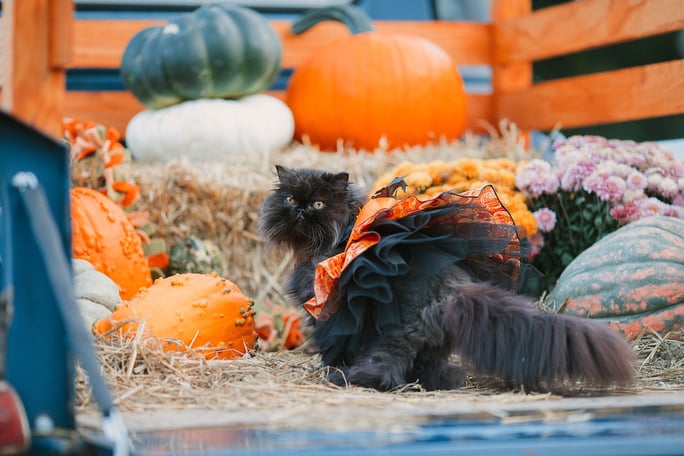Holiday Traditions That Can be Harmful to Your Pet
Updated on: October 26, 2022 | Author: Starwood Pet Travel

Some holidays are traditions that transcend international borders, whereas others are country-specific. So if you’re in a foreign country, you might find yourself observing a holiday that’s familiar or one that is entirely new. The one thing they all have in common is a celebration. Unfortunately, human celebrations can be a lot less fun for our pets. Dangerous, even.
That won’t do. As loving pet parents, we want our four-legged family members to be safe, above all. Keeping them from harm during holidays at home or abroad simply takes understanding and preparation.
“Harm” may depend on your perspective
When it comes to pet-harming foreign holidays, you might agree that the most extreme example is the 10-day Lychee and Dog Meat Festival held each June in Yulin, China. As many as 10,000 dogs are reportedly consumed during this event. Westerners find this unthinkable, but the truth is, there are cultures that do not revere dogs (or cats) solely as precious companions.
Black cats suffer from myths and superstition
Did you know that black cats are far less likely to be adopted than colored cats? Things can get scary around Halloween for our beloved black kitties. Many shelters will not allow adoptions of black cats during October, fearing that they could be used as Halloween props and then abandoned. PETA has stated they are "an easy target for Halloween pranksters who commit violent acts against unsuspecting kitties." It is true that animals are tortured and even killed each year – not only black cats and not only associated with holidays.
In ancient times, cats had it made. They were considered sacred by the Greeks and Egyptians and in Norse mythology. They were magic – until around the Middle Ages when black cats became reviled and feared because of their former association with pagan religions. They were the color of night, a source of “black magic,” and they were tortured and even burned alive.
On a happier note, today, black cats are still considered lucky in Asia and Great Britain. But they are still seen as icons of the “witchy” side of Halloween.
Make a lot of joyful noise – but don’t expect your pet to approve
Holidays and holiday-related actions that directly target dogs and cats with harm are quite rare. Instead, it’s the celebratory traditions that can cause problems for pets.
Your pet doesn’t have to be a black cat to be frightened at Halloween. What could be scarier than crowds of strange-looking, noisy kids repeatedly ringing the doorbell and shouting “trick or treat”? Many pets, especially cats, don’t appreciate chaos. Give your pet an anxiety-reducing break by finding them a quiet space indoors, away from the hubbub. Not only will they be calmer, but they won’t be able to dart out the door.
Fireworks are a notorious holiday danger for pets. In the US, the Fourth of July is probably the least favorite day of the year for your cat or dog, because many of them are afraid of loud noises. Your pet may hide in the closet. Or, left outside or given the chance to escape, they may run away, winding up injured or in a shelter.
If you’re traveling or moving to a foreign country with your pet, you should be aware that fireworks are a lot more common in countries outside the US. One reason is that most fireworks are illegal in most states. Beyond that, though, fireworks and firecrackers are embedded in numerous cultural celebrations. Every country pulls out all the stops for their independence day, whatever the date. Then there are holidays such as Chinese New Year. In Latin America and elsewhere, every major holiday including Christmas and New Year’s requires a big show of colorful fireworks as well as supersized firecrackers.
Holiday dangers lurk elsewhere, too
It’s not just what other people may do to your pet, or how they may be frightened or injured by noises, it’s what you – their adoring FurMom or FurDad – might inadvertently do to them. Holiday celebrations include foods and decorations that can be far more harmful to dogs and cats than creepy kids or noisy fireworks. That includes the candles in your jack-o-lanterns, the trimmings on your holiday tree, and all those omnipresent chocolates and other unsafe foods.
What you can do
Be aware of potential dangers associated with holidays, foreign or familiar. Holiday or not, don’t leave tempting-but-dangerous edibles, decorations, wrappings, or plants lying around where your dog or cat can get into trouble. Educate houseguests who aren’t pet-savvy about potential problems.
And be prepared. Sometimes things go wrong in spite of your best efforts. You’ll be able to respond quickest – and you’ll have greater peace of mind – if you know where your local animal emergency clinic is located and post their phone number where you can find it instantly. You should also create an emergency pet first aid kit. And if you’re heading to a foreign country, learn about local holidays that could pose extra dangers for your pet.
Subscribe to the Blog
Enjoy our content? Get them sent to your inbox!
Subscribe Now!

